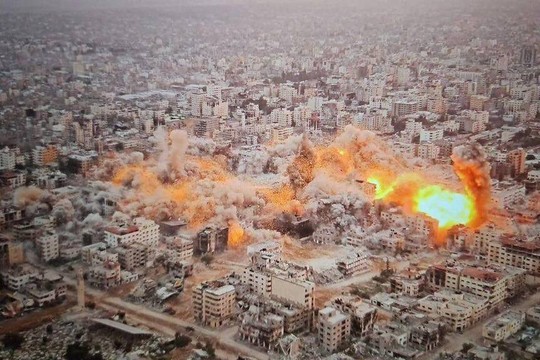Gaza under Israel bombing
Days of intense negotiations enabled the Biden administration to avoid casting a veto at the United Nations Security Council in defense of Israel’s military campaign in Gaza. But abstaining from a resolution designed to help more humanitarian aid reach Gaza only limited the damage to America’s standing around the world as it becomes an increasingly lonely protector of Israel, notes ‘The New York Times’.
The outcome was a relief to U.S. officials loath to exercise America’s veto power in defense of Israel for what would have been the third time since Hamas’s Oct. 7 attacks. Abstaining from a 13-0 vote may look better than casting a veto — which President Biden has said should be reserved for “rare, extraordinary situations” — but it still may not help America’s image abroad.
It is one reason, with the year drawing to a close, that the United States finds itself diplomatically isolated and in a defensive crouch.
That isolation is a dramatic turnaround in international perceptions for the Biden administration: For most of the past two years, top U.S. officials led what they saw as a valiant crusade to rally the world against Russia’s invasion of Ukraine. Mr. Biden and Secretary of State Antony J. Blinken were praised at home and abroad for uniting allies under the banner of American leadership as they invoked basic principles of international law and human rights.
Today, as the United States guards Israel’s interests at the United Nations, endorses its goal of destroying Hamas and provides its munitions, much of the world sees the Biden administration as enabling an indefensibly lethal Israeli military campaign, which President Biden himself has referred to as “indiscriminate bombing.”
Coalition building on behalf of Ukraine has turned to crisis management over Gaza. The United States is now at odds with staunch allies like France, Canada, Australia and Japan, all of whom voted earlier this month for a resolution calling for a cease-fire in Gaza. The United States vetoed that resolution, on the grounds that any cease-fire would allow Hamas to regroup and attack Israel again.
Human rights groups — which for months applauded U.S. efforts to hold Russia accountable — now denounce the United States for supporting Israel, which many of them accuse of committing war crimes in Gaza.
Israel blames Hamas for embedding itself among civilians and says it takes unusual steps to mitigate civilian casualties. The health ministry in Gaza says the death toll there is more than 20,000, although it is not known how many of those are civilians.
Senior Biden officials who found a clear sense of purpose in the project of uniting Europe against Russia privately admit that the past weeks have been difficult as the U.S. supplies and defends an Israeli campaign that has led to so much suffering and global outrage.
“No U.S. official right now likes this situation,” said Richard Gowan, an expert on the United Nations for International Crisis Group, a conflict prevention organization.
Adding to the anxiety is the fact that bad blood toward Washington over its role in the Gaza conflict could complicate other diplomatic goals for the United States, at least in the near term.
“We are isolated,” said Barbara Bodine, a former career diplomat and ambassador who is now the director of the Institute for the Study of Diplomacy at Georgetown University. She warned that the United States has lost the global good will it had earned from its response to Russia’s aggression. “For too many friends and allies, it just stood in such stark contrast to our response to Ukraine,” she said.
Mr. Blinken often cites Israel’s “right to defend itself,” a phrase he has also applied to Ukraine. He has also said separately that Russia’s invasion and the Oct. 7 Hamas attacks were moments for “moral clarity” around the world.
But much of the world sees things differently — especially, Ms. Bodine said, countries in the so-called “global south” that are not closely aligned with any major powers like the United States, China or Russia. Many of those countries, including South Africa and India, never saw the U.S. emphasis on Ukraine in the heroic terms that much of Europe did, Ms. Bodine said.
“Much of the global south did not feel that their conflicts and problems garnered the same level of concern and action,” she said. Then, when Mr. Biden and other U.S. officials seemed to greenlight a massive Israeli military response to Oct. 7 “without guardrails,” she added, it “painfully confirmed to many in the south this sense that there was a double standard.”
Bad blood over Gaza would make it harder to win support from those countries, in particular for pro-Ukraine resolutions, Mr. Gowan of Crisis Group warned.
That is great news for the Russian government. “The Russians have been reveling in this moment and they have used every possible opportunity to talk about U.S. double standards,” Mr. Gowan said. “At the end of the day the Russian strategy works, because beyond the United Nations what everyone sees is Russia standing up for international law — and the U.S. standing against it.”
read more in our Telegram-channel https://t.me/The_International_Affairs

 10:01 08.01.2024 •
10:01 08.01.2024 •























